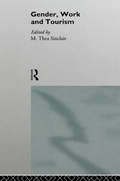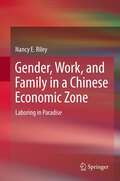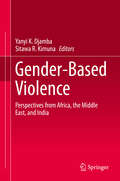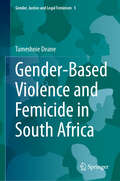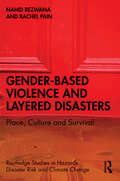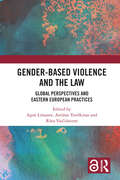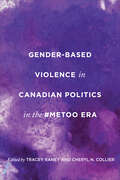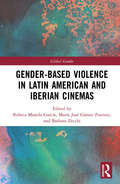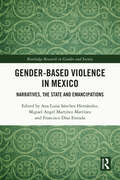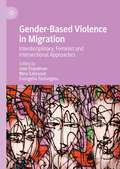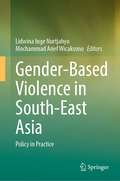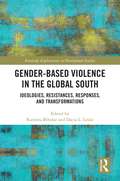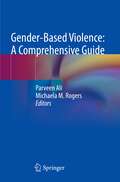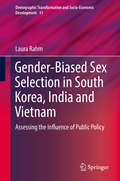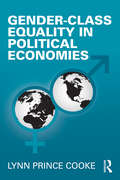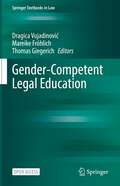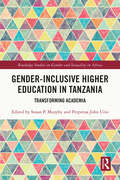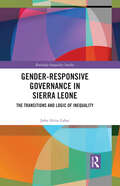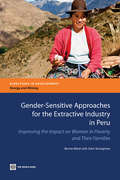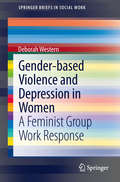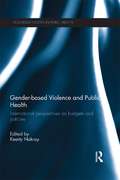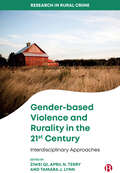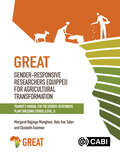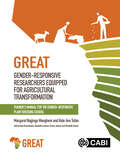- Table View
- List View
Gender, Work and Tourism
by M. Thea SinclairGender, Work and Tourism examines the central role played by women in the tourism industry. It discusses the nature of their work and the ways in which tourism creates tensions between the attitude and conduct of tourists and the beliefs and behaviour of local women. Among the areas explored are: the segmentation of tourism work in Northern Cyprus; women's and men's work in Bali and the division of social and political power; gendered tourism work in Mexico and the Philippines; material and ideological changes in sex tourism in South-East Asia and the exploitation of South-East Asian women in Japan.
Gender, Work, and Family in a Chinese Economic Zone
by Nancy E RileyThis book examines the dynamics of power within the families of married women who have migrated from rural areas to China's Dalian Economic Zone. Engaging the question of whether waged work gives women power in their families, this ethnographic study finds that women do indeed use their new positions and urban status to negotiate their family status. However, women use these new resources not necessarily to promote their own individual liberation, but rather to strengthen their contribution as wives and, especially, as mothers. Thus, this new modernity provides a space for the re-inscribing of traditional roles, even as it may work to give women new-found power within their families. How and why this process occurs is related to the dual inequalities these women face as rural migrants and as women.
Gender-Based Violence
by Yanyi K. Djamba Sitawa R. KimunaThis book offers new perspectives on gender-based violence in three regions where the subject has been taboo in everyday discourse often due to patriarchal cultural norms that limit women's autonomy. The contributions to this book provide rare insight into not only the levels and the socio-demographic determinants of domestic violence, but topics ranging from men's attitudes toward wife beating; domestic violence-related adolescent deaths, and women's health problems due to sexual and physical abuse. With a comprehensive introduction that provides a comparative international research framework for discussing gender-based violence in these three unique regions, this volume provides a key basis for understanding gender-based violence on a more global level. Part I, on Africa, covers men's attitudes towards domestic violence, the impact of poverty and fertility, the association between adolescent deaths and domestic violence, and the link between domestic abuse and HIV. Part II, on the Middle East, covers the importance of consanguinity on domestic violence in Egypt and Jordan, the effects of physical abuse on reproductive health, and the link between political unrests and women's experience and attitudes towards domestic violence. Part III, on India, shows how sexual abuse puts women at risk of reproductive tract infections and sexually transmitted infections, as well as the role of gender norms in wife abuse and the role of youth aggressive behavior in nonconsensual sex. With such a deep and broad coverage of factors of intimate partner abuse, this book serves as a reference document for researchers, decision-makers, and organizations that are searching for ways to reduce gender-based domestic violence. This book is of interest for researchers in Criminology and Criminal Justice, as well as Sociology, Social Work, Public Health and Human Rights.
Gender-Based Violence and Femicide in South Africa (Gender, Justice and Legal Feminism #5)
by Tameshnie DeaneThis book presents new perspectives on gender-based violence (GBV) in South Africa. It argues that violence against women is a manifestation of unequal gender relations and harmful manifestations of hegemonic masculinity, which are governed by patriarchal beliefs, institutions and systems. It includes chapters on quantitative research that assess not only the levels and determinants of violence against women but also men’s attitudes towards gender-based violence, perceptions of violence, the legislative frameworks governing violence against women in South Africa, and the current cases and jurisprudence relating to this scourge. In spite of its focus on South Africa, the book also provides insights for comparative scholars exploring the value of different constitutional articulations of human rights and how they support (or fail to support) efforts to combat violence against women. By assessing recent incidents and responses to gender-based violence, the book provides a view of not only the societal but also jurisprudential opportunities and pitfalls in this area that may be applicable elsewhere. Gender equality and, central to this, the right of women to live lives free of violence, is a precondition for full democratic participation and is a universal goal. Accordingly, the South African experience contributes to a wider understanding of the possibilities and limitations of societal and legal reform in challenging the ubiquity of violence against women. The book is aimed at researchers, practitioners, students, professionals and advocates in the field of gender-based violence.
Gender-Based Violence and Layered Disasters: Place, Culture and Survival (Routledge Studies in Hazards, Disaster Risk and Climate Change)
by Rachel Pain Nahid RezwanaThis book investigates the widespread and persistent relationship between disasters and gender-based violence, drawing on new research with victim-survivors to show how the two forms of harm constitute ‘layered disasters’ in particular places, intensifying and reproducing one another. The evidence is now overwhelming that disasters and gender-based violence are closely connected, not just in moments of crisis but in the years that follow as the social, economic and environmental impacts of disasters play out. This book addresses two key gaps in research. First, it examines what causes the relationship between disasters and gender-based violence to be so widespread and so enduring. Second, it highlights victim-survivors’ own accounts of gender-based violence and disasters. It does so by presenting findings from original research on cyclones and flooding in Bangladesh and the UK and a review of global evidence on the Covid-19 pandemic. Drawing on feminist theories, it conceptualises the coincidence of gender-based violence, disasters and other aggravating factors in particular places as ‘layered disasters.’ Taking an intersectional approach that emphasises the connections between culture, place, patriarchy, racism, poverty, settler-colonialism, environmental degradation and climate change, the authors show the significance of gender-based violence in creating vulnerability to future disasters. Forefronting victim-survivors’ experiences and understandings, the book explores the important role of trauma, and how those affected go about the process of survival and recovery. Understanding disasters as layered casts light on why tackling gender-based violence must be a key priority in disaster planning, management and recovery. The book concludes by exploring critiques of existing formal responses, which often ignore or underplay gender-based violence. The book will be of interest to all those interested in understanding the causes and impacts of disasters, as well as scholars and researchers of gender and gender-based violence.
Gender-Based Violence and the Law: Global Perspectives and Eastern European Practices
by Agnė Limantė Artūras Tereškinas Rūta VaičiūnienėThis book presents a novel and insightful examination of gender-based violence, inviting readers to consider this topic from various perspectives. It encompasses various conceptual discussions and international regulations and trends, while concurrently emphasising the legal regulations and practices of select Central and Eastern European countries. Significantly underrepresented in legal scholarship, this region has been overlooked and subject to limited comprehensive analyses. The authors address different aspects of gender-based violence, also covering some areas that have received little attention in academic literature, such as gender-based violence in academia and cyberstalking. Furthermore, the book incorporates recent empirical studies, thereby endowing readers with valuable insights into the specific challenges encountered in the region. By contributing to current research on gender-based violence in Europe, this publication is an invaluable resource for researchers, students, policymakers, and general readers interested in gender-based violence and the fight against it in the Central and Eastern European region.
Gender-Based Violence and the Law: Global Perspectives and Eastern European Practices
by Agnė Limantė Artūras Tereškinas Rūta VaičiūnienėThis book presents a novel and insightful examination of gender-based violence, inviting readers to consider this topic from various perspectives. It encompasses various conceptual discussions and international regulations and trends, while concurrently emphasising the legal regulations and practices of select Central and Eastern European countries. Significantly underrepresented in legal scholarship, this region has been overlooked and subject to limited comprehensive analyses. The authors address different aspects of gender-based violence, also covering some areas that have received little attention in academic literature, such as gender-based violence in academia and cyberstalking. Furthermore, the book incorporates recent empirical studies, thereby endowing readers with valuable insights into the specific challenges encountered in the region. By contributing to current research on gender-based violence in Europe, this publication is an invaluable resource for researchers, students, policymakers, and general readers interested in gender-based violence and the fight against it in the Central and Eastern European region.
Gender-Based Violence in Canadian Politics in the #MeToo Era
by Cheryl N. Collier Tracey RaneyGender-based violence in politics is a significant and growing problem that threatens the democratic process in Canada. Despite its prevalence, little academic research has been conducted on this topic to date. Gender-Based Violence in Canadian Politics in the #MeToo Era raises awareness of and presents new innovative research on this timely and pressing public issue. Here, leading experts from across Canada uncover critical new insights and identify potential solutions that would help address gender-based violence in politics, improve gender equality, and strengthen Canadian democracy. Using an intersectional lens, chapters range in their approaches; offer new concepts and measures of gender-based violence in online political spaces, political media coverage and cartoons, campaigns, municipal politics, and legislatures; and explore Indigenous ways of knowing about gender-based violence in Canadian politics. Additionally, the volume presents recommendations for decision-makers, policymakers, anti-violence advocates, and the academic community on how to best address the problem of gender-based violence in the political sphere.
Gender-Based Violence in Latin American and Iberian Cinemas (Global Gender)
by María José García Rebeca Maseda / Gámez Fuentes Barbara ZecchiGender-Based Violence in Latin American and Iberian Cinemas rethinks the intersection between violence and its gendered representation. This is a groundbreaking contribution to the international debate on the cinematic construction of gender-based violence. With essays from diverse cultural backgrounds and institutions, this collection analyzes a wide range of films across Latin America and the Iberian Peninsula. The volume makes use of varied perspectives including feminist, postcolonial, and queer theory to consider such issues as the visual configuration of power and inequality, the objectification and the invisibilization of women’s and LGBTQ subjects’ resistance, the role of female film-makers in transforming hegemonic accounts of violence, and the subversion of common tropes of gendered violence. This will be of significance for students and scholars in Latin American and Iberian studies, as well as in film studies, cultural studies, and gender and queer studies.
Gender-Based Violence in Mexico: Narratives, the State and Emancipations (Routledge Research in Gender and Society)
by Martínez Martínez, Miguel Angel Francisco Díaz EstradaThis book examines the roots of systemic aggression against women in contemporary Mexico, and the connection between social practices and the institutional permissiveness of the Mexican State with regard to gendered violence. Since the democratic transition at the end of the 1990s, Mexico has registered an increase in the intensity and types of violence that have made life in some regions almost unsustainable. The chapters in this volume consider that capitalism, colonialism and patriarchy are interrelated processes that employ the technologies of gender and race as a continuation of the symbolic hegemony that treats feminized and racialized bodies as disposable. Against this background, it becomes necessary to understand from different dimensions the systemic violence against women as well as the processes of articulation between social practices and the permissiveness of the State in the face of aggression. Gender-Based Violence in Mexico mobilizes a dialogue between writings, fields of knowledge, causes and situations as essential tools for the struggle against gender violence. As a situated work that underlines the systematic roots of the violence that keeps women in subaltern positions, the text seeks an insurrection, an uprising of the bodies that invite naming the abject, peripheral and unseen populations of the project of globalized life, woven by the obsession of success and prestige. It presents a counter-conclusion in the manner of a beginning in the desire to elaborate counter-political and counter-pedagogical strategies of non-coercive experiences, where questions and debates are not a sign of belligerence but of vitality and care for the body-territories. Gender-Based Violence in Mexico will appeal to scholars of sociology, criminology, gender and Latin American studies with interests in gendered violence and injustice.
Gender-Based Violence in Migration: Interdisciplinary, Feminist and Intersectional Approaches
by Jane Freedman Nina Sahraoui Evangelia TastsoglouWith contributions from a diverse array of international scholars, this edited volume offers a renewed understanding of gender-based violence (GBV) by examining its social and political dimensions in migration contexts. This book engages micro, meso, and macro levels of analysis by foregrounding a conceptualization of GBV that addresses both its interpersonal and structural causes. Chapters explore how GBV frameworks and migration management intersect, bringing to the forefront the specific inequalities these intersections produce for migrant women. Drawing upon several disciplines, the authors engage in co-writing a critical engagement which proposes an original understanding of how the concepts of intersectionality, vulnerability and precarity speak to each other from a feminist perspective. This volume will be of interest to scholars/researchers and policymakers in Gender Studies, Migration and Refugee Studies, Sociology, Political Science, Trauma Studies, Human Rights and Socio-Legal Studies.
Gender-Based Violence in South-East Asia: Policy in Practice
by Lidwina Inge Nurtjahyo Mochammad Arief WicaksonoThis book presents new research on gender-based violence in Southeast Asia, bringing together varied scholarly work in law, policy, and practice. It enables a greater understanding of violence against women as an international concern, highlighting particular issues that arise in the region. Against a background of international obligations to ensure women's rights through laws and policies that are geared at ending violence against women and girls, this research documents the state failures, individual shame and fear, and societal culture that collectively affects the reporting, investigation, prosecution of perpetrators, and protection of victims. The research explores differing legal mechanisms both internationally, and within nation states, relating to cases of physical and sexual violence. It recognizes the need for functioning mechanisms to ensure women can report their cases safely and be provided with protective and therapeutic services in a way that is systematic, effective, and measurable. Laws and court decisions are analyzed, crisis and safety centers are examined, and in-depth interviews are conducted with actors and NGOs with relevant roles and functions in the mechanism of cases of violence against women. The result is a comprehensive assessment of the incalculable harm it does within Southeast Asian society, and the obstacles it presents for law enforcement. The chapters uncover mechanisms with unique characteristics across Southeast Asia, providing a nuanced understanding of the cultural and social backgrounds, as well as the religious structures, that can both help and hinder suitable frameworks. It is relevant to scholars, policymakers, and practitioners in law, criminology, and gender sociology.“This is a valuable contribution towards empowering the women of South East Asia out of victimhood to valued equality, involvement in governance and leadership through the elimination of violence and discrimination and an excellent resource not just for those working in this field but for those involved in law making, the media and the people of South East Asia.”- Professor Felicity Gerry QC, Barrister at Crockett Chambers Melbourne and Libertas Chambers, London, and Professor of Legal Practice at Deakin University and Honorary Professor at Salford University.
Gender-Based Violence in the Global South: Ideologies, Resistances, Responses, and Transformations (Routledge Explorations in Development Studies)
by Dacia L. LeslieThis book amplifies the different voices and experiences of those facing gender-based violence (GBV) in the Global South. It explores the localised ways in which marginalised individuals design modes of coping with and address GBV, including cultural interpretations, and artistic and faith-based expressions.The book examines GBV triggers, prevalence, and societal impacts while referring to community, national, and regional mobilisation to deal with the phenomenon in its various manifestations, including physical, psychological, political, domestic, and public violence. It explores issues related to women’s negotiations with the patriarchal underpinnings of GBV; the role of the law and history in the perpetuation of GBV; the complementary role of culture and faith to legal protection against GBV, and access to justice for women and girls. In doing so, the book exposes understandings and expressions of GBV, as well as methodologies and indigenous initiatives to prevent it through local viable solutions. The book thus challenges the normalisation of GBV in the Global South.Providing concrete and culturally relevant suggestions for challenging ingrained models of gender understandings of violence in the Global South, this book will be of interest to academics in the fields of Development Studies, Gender Studies, Women’s Studies, Violence and Abuse Studies, Human Rights, Criminal Law, and Socio-Legal Studies.
Gender-Based Violence: A Comprehensive Guide
by Parveen Ali Michaela M. RogersThis book provides comprehensive information about various types of gender-based violence (GBV) and abuse. GBV is a major public health and social problem that affects people, mostly women and girls, in every community, culture, and country. GBV refers to the violence or a pattern of abusive behaviours including physical aggression, sexual coercion, psychological abuse and controlling behaviours resulting in physical, sexual or psychological harm. It is associated with severe physical and psychological consequences, and can result in death. . GBV can take many forms including female foeticide, infanticide, female genital mutilation, child marriage, grooming, trafficking, forced marriage, dowry- related abuse, honour-based violence, rape, sexual assault, stalking, harassment, street violence, abuse against older people, domestic violence, and intimate partner violence. It can take place in public, private and virtual settings, and within the context of intimate, familial, community and institutional relationships. While all these forms affect girls and women more, boys and men can also be exposed of various forms of violence including child abuse, sexual abuse, wartime violence, corporal punishment to name a few. This book takes a unique approach and presents an overview of gender-based violence and related practices throughout the world. The book is written in a user friendly manner in order to be accessible as an introductory text to a wide range of readers including students, practitioners and researchers. Edited by a public health academic and a social worker, with contributions representing a wide range of disciplines, the book will appeal to many professions including nurses, midwives, social care and social work practitioners, police, teachers, psychologists, and sociologists.
Gender-Biased Sex Selection in South Korea, India and Vietnam: Assessing the Influence of Public Policy (Demographic Transformation and Socio-Economic Development #11)
by Laura RahmThis book provides an in-depth analysis of the influence of public policy on sex selection. Three Asian countries were chosen for the comparative policy analysis, namely South Korea, India and Vietnam that share in common a historical legacy of son preference, high levels of sex imbalances and active policy response to curbing the growing demographic masculinization of their nations. The research based on the data collected from field work in the three countries shows that despite the adoption of very similar anti-sex selection policies the outcomes have been markedly different for each of the three countries. These unexpected diverse outcomes are explained partly by their different historical and cultural contexts, and partly to the different social, political and economic institutions and dynamics. This monograph offers careful and detailed explanations of both within and across country diversities in policy outcomes, pointing to the importance and the limits of cross-national policy learning and adoption, and raising questions about the efficacy of international organizations’ current approaches to global policy and knowledge transfer.
Gender-Class Equality in Political Economies (Perspectives on Gender)
by Lynn Prince CookeGender-Class Equality in Political Economies offers an in-depth analysis of gender-class equality across six countries to reveal why gender-class equality in paid and unpaid work remains elusive, and what more policy might do to achieve better social and economic outcomes. This book is the first to meld cross-time with cross-country comparisons, link macro structures to micro behavior, and connect class with gender dynamics to yield fresh insights into where we are on the road to gender equality, why it varies across industrialized countries, and the barriers to further progress.
Gender-Competent Legal Education (Springer Textbooks in Law)
by Thomas Giegerich Dragica Vujadinović Mareike FröhlichMale-dominated law and legal knowledge essentially characterized the whole of pre-modern history in that the patriarchy represented the axis of social relations in both the private and public spheres. Indeed, modern and even contemporary law still have embedded elements of patriarchal heritage, even in the secular modern legal systems of Western developed countries, either within the content of legislation or in terms of its implementation and interpretation. This is true to a greater or lesser extent across legal systems, although the secular modern legal systems of the Western developed countries have made great advances in terms of gender equality. The traditional understanding of law has always been self-evidently dominated by men, but modern law and its understanding have also been more or less “malestreamed.” Therefore, it has become necessary to overcome the given “maskulinity” of legal thought. In contemporary legal and political orders, gender mainstreaming of law has been of the utmost importance for overcoming deeply and persistently embedded power relations and gender-based, unequal social relations. At the same time and equally importantly, the gender mainstreaming of legal education – to which this book aims to contribute – can help to gradually eliminate this male dominance and accompanying power relations from legal education and higher education as a whole. This open access textbook provides an overview of gender issues in all areas of law, including sociological, historical and methodological issues. Written for students and teachers around the globe, it is intended to provide both a general overview and in-depth knowledge in the individual areas of law. Relevant court decisions and case studies are supplied throughout the book.
Gender-Inclusive Higher Education in Tanzania: Transforming Academia (Routledge Studies on Gender and Sexuality in Africa)
by Susan P. Murphy Perpetua John UrioWhilst there is an extensive body of research exploring the barriers to gender equality and female empowerment in high-income states, there are far fewer systematic analyses within lower-income settings. This book draws on extensive empirical data to analyse gender mainstreaming and gender transformative actions in Tanzanian higher education.The book maps the practical landscape of gender mainstreaming across 14 universities in Tanzania, and the theoretical landscape of African theories of masculinities and femininities underpinning educational institutions and practices. It then assesses the Gender Awareness and Transformation through Education project, which was designed to support the development of gender expertise and capacities in research and education at one specific institution, across both its administrative and academic units. Current and future academics at Dar es Salaam University College of Education were trained in gender-based research and education, and a strategic plan was developed to guide in the establishment of a Gender Research Centre that will provide gender expertise in research and teaching to the College; and, over time, to other HEIs nationally and regionally. By bringing together real-world insights from action-based research, the book demonstrates the impact of real-time social change and gender transformation, with implications both for Tanzania and beyond.Bringing novel empirical insights and policy recommendations, this book will be of interest to researchers and policy makers across the fields of gender studies, education, and African studies.
Gender-Responsive Governance in Sierra Leone: The Transitions and Logic of Inequality (Routledge Inequality Studies)
by John Idriss LahaiThis book investigates gender equality and women’s empowerment in Sierra Leone, focusing in particular on women’s interactions with the state and its development partners. In particular, it highlights women’s increasing agency in acquiring knowledge, diffusing power, engaging in grassroots politics, and compelling the government to adopt more gender-responsive policies. Drawing on extensive fieldwork and original multidisciplinary research methods (including econometric and statistical models), the book first sets out the history and impact of inequality in Sierra Leone. It then goes on to shed light on the constructive and collaborative engagement of women and the state on a variety of local and external strategies for promoting gender equality. Drawing throughout on insights from across gender studies, sociology, anthropology, economics, and political science, the book highlights how women are succeeding in transforming marginality into agency in order to build a platform for influencing change. By qualifying and quantifying the challenges of gender inequality in Sierra Leone, and the progress that is being made, this book provides important insights that will be relevant to other fragile, post-conflict states within Africa. The book will be of interest to students and researchers studying women and gender studies, African studies, economics, international development, sociology, and political science and international relations. The book will also deepen policymakers’ and practitioners’ understanding of women’s diverse trajectories and experiences, and how the typology of government affects the patterns of inequality and equality.
Gender-Sensitive Approaches for the Extractive Industry in Peru
by John Strongman Bernie WardLarge amounts of 'development assistance' in the form of infrastructure and social programs are annually made available to communities across Peru due the presence of extractive industry companies. These investments however do not always achieve the social development impact anticipated. As one company pointed out: "our company has invested millions of dollars in social programs in our neighboring communities, however the indicators for child malnutrition and maternal health have seen no noticeable improvement". Communities base their support or rejection for extractive industry operations by weighing up the benefits against the risks; where the risk-benefit balance sheet does not look positive, conflict is likely. Companies, and the governments who benefit from their tax revenues, therefore work hard to reduce risks and increase benefits for communities: but this report confirms an overlooked aspect of the development outcomes: men are capturing more of the benefits and these are not necessarily reaching the wider family; whereas it is the women and children who experience more of the risks that arise from the presence of extractive industry projects. The impact on women could be significantly improved by taking simple steps with little additional effort or cost - disaggregating data by sex, strengthening consultations with women, investigating issues of risk to women, improving women's access to benefits. Additionally this report challenges the "development industry" (those non-governmental organizations, community-based organizations, universities, research centers, think tanks, funders, foundations and training organizations for whom the development of theories and practices to alleviate poverty is a primary objective.) to work more closely with local government and companies, sharing its knowledge on thematic issues such as gender (and other areas such as Rights-Based Approaches or Community-Driven Development) and on programs (such as maternal health, bi-lingual education, or productive chain development) to achieve what the NGOs, civil society and local government have within their mandates to deliver, and what the EI sector seeks.
Gender-based Violence and Depression in Women
by Deborah WesternSocial workers, in whatever capacity they work, can expect to come into contact with women who have experienced/are experiencing violence and with women who are experiencing depression. Therefore, a range of social work supports and interventions are required in order to meet the needs of diverse women and assist them in their recovery. One of these methods is group work where women can share their experiences, learn from each other, reflect on their learnings and identify and achieve changes in their circumstances. This book is based on original research by the author that sought to understand depression in women from a feminist and gender-informed perspective, develop a feminist-based group work response, and highlight the activities of consciousness-raising and resistance as methods for women to achieve change in their lives and in their selves. An innovative and creative group work program, the Women's Journaling Group Program, was developed from this research and provides a new method of working with women who have experienced/are experiencing violence and mild-moderate depression. The Women's Journaling Group Program is research-informed, theoretically-grounded, practice-based and feminist and gender-focused. This book, and the program model within it, is an important contribution to the field of critical feminist social work practice.
Gender-based Violence and Public Health: International perspectives on budgets and policies
by Keerty NakrayGender-based violence is a multi-faceted public health problem with numerous consequences for an individual’s physical and mental health and wellbeing. This collection develops a comprehensive public health approach for working with gender-based violence, paying specific attention to international budgets, policies and practice and drawing on a wide selection of empirical studies. Divided into two parts, the text looks at how public health budgets and policies can be used to influence a range of risk factors and outcomes, and then outlines a theoretical and conceptual framework. The second section draws on empirical studies to illustrate ways of managing the risks and impacts of, and responses to, the problem. It concludes by summarising those risk factors that can be effectively addressed through appropriately budgeted public health programmes globally. Highlighting ways of bolstering protective and resilience factors and identifying early interventions, it demonstrates the importance of inter-agency interventions through coordinated effort from a wide range of sectors including social services, education, religious organisations, judiciary, police, media and business. This inter-disciplinary volume will interest students and researchers working on gender-based violence, gender budgeting and public health policy from a range of backgrounds, including public health, sociology, social work, public policy, gender studies, development studies and economics.
Gender-based Violence and Rurality in the 21st Century: Interdisciplinary Approaches
by Ziwei Qi, April N. Terry, Tamara J. Lynn and Walter S. DeKeseredyGender-based violence (GBV) can take many forms and have detrimental effects across generations and cultures. The triangulation of GBV, rurality and rural culture is a challenging and essential topic and this edited collection provides an innovative analysis of GBV in rural communities. Focusing on under-studied and/or oppressed groups such as immigrants and LGBTQIA+ people, the book explores new theories on patterns of violence. Giving insights into GBV education and prevention, the text introduces community justice and victim advocacy approaches to tackling issues of GBV in rural areas. From policy review into actionable change, the editors examine best practices to positively affect the lives of survivors.
Gender-responsive Researchers Equipped for Agricultural Transformation, Level 2.: Trainer’s Manual for the Gender-Responsive Plant Breeding Course
by Dr Margaret Najjingo Mangheni Professor Hale Ann Tufan Dr Elizabeth AsiimweThis manual presents the training process for the Gender-Responsive Plant Breeding course, implemented by Makerere and Cornell Universities, over a period of five years (2016-2020), under the Gender-Responsive Researchers Equipped for Agricultural Transformation (GREAT) project funded by the Bill and Melinda Gates Foundation. It has five broad parts: I) Introduction; II) Required preparation before the course; III) Phase one (9-day, face-to-face training); IV) the 5-month Field Training phase; and V) Phase two (5-day, face-to-face training). Each session consists of specific learning objectives, session plans and slides, delivery methods, practical exercises and examples, as well as relevant tips and synthesized take-home messages. The sessions were developed by an international multidisciplinary team of experts in gender and agriculture and subjected to a rigorous peer review and quality assurance process. GREAT aims to contribute to building a pool of gender-responsive agricultural researchers able to advance more equitable and effective agricultural systems in Africa and beyond. This manual is for all facilitators/trainers interested in applied, gender responsive agricultural research.
Gender-responsive Researchers Equipped for Agricultural Transformation: Trainer’s Manual for the Gender-Responsive Plant Breeding Course
by Dr Margaret Najjingo Mangheni Professor Hale Ann TufanThis manual presents the training process for the Gender-Responsive Plant Breeding course, implemented by Makerere and Cornell Universities, over a period of five years (2016-2020), under the Gender-Responsive Researchers Equipped for Agricultural Transformation (GREAT) project funded by the Bill and Melinda Gates Foundation. It has five broad parts: I) Introduction; II) Required preparation before the course; III) Phase one (9-day, face-to-face training); IV) the 5-month Field Training phase; and V) Phase two (5-day, face-to-face training). Each session consists of specific learning objectives, session plans and slides, delivery methods, practical exercises and examples, as well as relevant tips and synthesized take-home messages. The sessions were developed by an international multidisciplinary team of experts in gender and agriculture and subjected to a rigorous peer review and quality assurance process. GREAT aims to contribute to building a pool of gender-responsive agricultural researchers able to advance more equitable and effective agricultural systems in Africa and beyond. This manual is for all facilitators/trainers interested in applied, gender responsive agricultural research.
